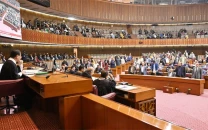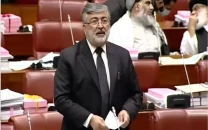Official proposal: PIA asked to cut Hajj airfare by 40%
Religious affairs ministry awaits national carrier’s response

Pilgrims perform Tawaf al-Wadaa (the final walk around the Kaaba) at the Grand Masjid on November 30, 2009. PHOTO: AFP
Minister of State for Religious Affairs Pir Aminul Hasnat Shah told the lower house of parliament on Friday the government had completed all necessary arrangements, including accommodation and transportation, for pilgrims visiting Makkah and Medina.
He said the government would announce the revised Hajj airfare after receiving a positive reply from the state-owned airline.
With the aim to stabilise an unrealistic hike in fares, the PIA announced a reduction in its domestic and international fares in February.

“The national carrier has taken the decision to reduce its fares, in order to facilitate its valued customers and stabilise the unrealistic rise in airfares caused by the recent strike,” a PIA press release stated.
Airfares for Karachi-Islamabad-Karachi and Karachi-Lahore-Karachi currently is Rs7,500. Return tickets for Umra passengers cost Rs54,500 for people living in Lahore and Islamabad, and Rs44,500 for those travelling from Karachi.
Hepatitis-prone districts
During the question-hour, the government also revealed there are 25 districts, including Islamabad, with high prevalence of Hepatitis B and C patients in the country.
According to the statistics provided by national health services, regulations and coordination ministry in a written reply, Islamabad has a high prevalence of Hepatitis B (5.6%) and C (4%).
The statistics are from the National Hepatitis Survey conducted in 2008, when the total population of Islamabad was estimated to be 1,025,000.
The other high-prevalence districts are Dera Ghazi Khan, Rahim Yar Khan, Jhang, Rajanpur, Vehari, Hafizabad. Pakpatan, Bahawalnagar, Bahawalpur and Okara in Punjab; Khairpur, Ghotki, Sanghar and Dadu in Sindh; Upper Dir, Lower Dir, Hangu and Swat in Khyber-Pakhtunkhwa; and Musakhel, Loralai, Sibi, Jaffarabad, Barkhan and Zhob in Balochistan.
The health minister stated the federal government recognised hepatitis as a major public threat in the country and had taken steps for its prevention and control. These include awareness campaigns on media and implementation of infection control campaign in the 25 high-risk districts. Preventive medicines for HCV and certified vaccines for HBV are also being sold in the market.
Spurious medicines
The health minister maintained the regulation of sale of medicines, under the Drugs Act of 1976, was a provincial subject, for which respective governments have been asked to reply.
However, she wrote, the federal government has taken some steps for eradication of spurious drugs in the market.
Under the Drug Regulatory Authority of Pakistan (DRAP) Act, more than 27,000 samples were taken last year by the federal and provincial inspectors of drugs throughout the country, out of which only 3.36 per cent were found to be out of specifications.
DRAP suspended the production of 17 firms and 15 were served show-cause notices over non-compliance of good manufacturing practices. Moreover, registration of 20 drugs was also suspended.
Published in The Express Tribune, March 26th, 2016.



















COMMENTS
Comments are moderated and generally will be posted if they are on-topic and not abusive.
For more information, please see our Comments FAQ